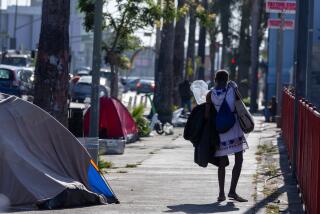Measure R Absentee Voting May Set Mark : Tax: Ballot requests already total 85,000, indicating strong interest in proposed O.C. half-cent sales levy.
SANTA ANA — A torrent of requests for absentee ballots has flooded the Orange County registrar of voters office, demonstrating high citizen interest in the June 27 Measure R election and setting the stage for a possible record absentee vote.
The number of requests processed through Tuesday already exceeds the total filed in any recent Orange County special election. If the trend continues through the June 20 deadline for mailed absentee ballot applications, the number of requests could top even the total for recent general elections for governor and president, voter officials said.
Leaders of the two sides in the contest over a proposed half-cent sales tax increase see the surge in requests as favorable to their positions. Political observers, who are also struck by the tide of applications, conclude that heightened attention to the county’s financial crisis is translating into strong voter interest.
“I think this shows a lot of interest, an intense amount of interest in a highly publicized issue,” said Richard Temple, a Sacramento- based political consultant who works for Republicans statewide. “It says there are a lot of informed, motivated, passionate voters who don’t need much encouragement to participate in this election.”
As Tuesday ended, the registrar’s office had processed about 85,000 requests for absentee ballots from the county’s 1.1 million registered voters, said Bev Warner, supervisor at the registrar’s office. If that rate of requests continues, some 175,000 to 200,000 absentee ballots would be mailed out to voters, she said.
“I still see that trend,” she said, though she noted that applications could slow to a trickle at any time. “It is huge right now. . . . If it keeps up, it could be a record.”
Traditionally, about 80% of absentee ballots are turned in. Absentee voters commonly make up one-fourth to one-sixth of votes cast.
The absentee ballot requests are being generated by several sources. The largest is the county itself, which from May 17 to May 24 mailed every voter sample ballots containing each side’s argument and an application for an absentee ballot.
In addition, the campaigns for and against Measure R have launched absentee ballot efforts of their own.
Citizens for Economic Progress, a pro-Measure R group headed by Sheriff Brad Gates, began mailing 750,000 absentee ballot applications, along with campaign literature, May 15.
Voters can apply for absentee ballots by filling out the personalized form in the mailer and sending it back to the campaign, postage free. The campaign submits the application to the registrar’s office, which sends a ballot directly to the voter.
In addition to Gates’ group, the California Teachers Assn. and the League of Women Voters, which support Measure R, and the Howard Jarvis Taxpayers Assn., which opposes it, plan absentee ballot mailers to their Orange County members.
Political observers agree that, compared to the average registered voter, those who request absentee ballots are more likely to cast a vote, more conservative and more likely to oppose a tax increase. One challenge for Measure R supporters has been to expand that pool beyond the hard-core anti-tax voter.
Mark Baldassare, who conducts The Times Orange County Poll, said the high numbers “would indicate we are moving beyond the typical absentee voters. Then the question becomes: Is there enough to offset the typically high conservative and anti-tax vote in Orange County?”
The answer depends in part on whether absentee voters make up their usual one-fourth to one-sixth of the total vote in an unusual, one-issue election that will be held as the summer vacation season begins. If the traditional ratios hold true, a big turnout can be expected.
“It is not clear whether this will mean a big turnout,” said Republican political consultant Arnie Steinberg. “You are never sure [if a large absentee vote] will just make a bigger piece of the turnout or the entire turnout is going to be up.”
Traditionally, those who receive absentee ballots vote at an 80% rate; in some years, such as the 1992 presidential election, the absentee turnout is even higher. In that race, 171,566 voters received absentee ballots and 151,156 were counted.
Those figures show why political campaigns make such a point of contacting absentee voters by mail. Tom Fuentes, chairman of the county Republican Party, said absentee voting is a growing trend and will be even more significant in a one-issue election such as this one.
“Why bother to drive all the way to the poll, when you can do it so easily at home by mail?” he asked.
Another way of sifting the absentee ballot tea leaves is to examine the 85,000 requests already filed. About 22,000 of them have come from permanent absentee voters, who either have no polling place or who always vote absentee.
Another 47,500 filed their applications from the sample ballot sent out by the county, while 15,500 filed through a campaign. The vast majority of the latter group probably came from Gates’ pro-Measure R campaign.
Mark Thompson, spokesman for Citizens Against the Tax Increase, a Republican business group opposed to Measure R, said he is “delighted by these numbers.”
“What this means is that out of all the money [the Yes side has] spent to date . . . the most they have been able to generate is 15,000 absentee ballot requests. And I don’t think they are getting all those votes.”
“If I were them,” he added, “I would be damned scared that 47,000 have applied for the sample ballot.”
Thompson predicted a substantial absentee vote. “We have thought all along the vote would be higher because of the high publicity,” he said. “I expect to see the absentee numbers go up another 35,000 to 40,000.”
Stu Mollrich, campaign coordinator for the pro-initiative Citizens for Economic Progress, said the numbers at the registrar’s office tell only part of the story. Mollrich said his group had received 25,000 absentee ballot applications by Tuesday and expects at least 25,000 more.
“I don’t think [the absentee pace] is going to all of a sudden die,” he said. “I would be surprised if they don’t get at least 150,000” requests from all sources.
Mollrich rejected the idea that sample ballot numbers are bad news.
“By a margin of 2 to 1 historically, people use the official county form,” he said. “The ones who use the campaign form are hard-core supporters. We are generating a lot of votes from those and think we will get our share of” the sample ballot voters.
The good news for Measure R supporters, he said, is that the early numbers indicate a high turnout; traditionally in Orange County, sales tax proposals lose in low-turnout elections.
“It only make sense for us to want a high turnout,” he said.
* FUNDS FROM FANNIE MAE: Judge turns $118.5 million over to county, schools. A10
(BEGIN TEXT OF INFOBOX / INFOGRAPHIC)
Absent and Counting
About 85,000 Orange County voters have already requested absentee ballots for the Measure R special election on June 27. At that rate, officials expect 175,000 to 200,000 voters to receive absentee ballots this election. That would exceed the number of requests for the 1992 presidential election and last year’s gubernatorial election. A look at past absentee voting:
Absentee % of all Election voters voters 1991 special election (Measure J) 60,910 33 1992 primary 78,471 16 1992 general 151,156 15 1993 32nd state Senate primary 17,284 47 1993 32nd state Senate general 85,064 20 1994 primary 79,218 20 1994 general 155,500 20 1995 35th state Senate primary 27,579 46 1995 35th state Senate general 26,106 56
Source: Orange County registrar of voters
More to Read
Sign up for Essential California
The most important California stories and recommendations in your inbox every morning.
You may occasionally receive promotional content from the Los Angeles Times.










